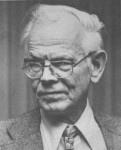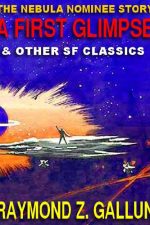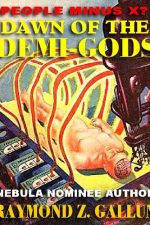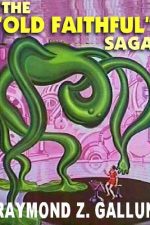 Raymond Z. Gallun (1911-94) was, with his colleague Jack Williamson, one of the only two science fiction writers from the earliest days of the pulps, in the 1920s, who were so far ahead of the other writers of their time in terms of sophisticated treatment of sophisticated ideas that they were able to adapt their style and storytelling techniques to the field’s constantly evolving editorial standards and continued to produce vigorous, first-rate work well into the 1980s and ’90s. In fact, some of Gallun’s best work would be produced late in his career: his 1985 novel “Bioblast” with its groundbreaking new approach to psychic powers (available from PageTurner Editions), his Nebula nominee masterpiece about Martian colonization, “Skyclimber” (available from PageTurner Editions), and two Nebula nominee novelettes for Analog, “A First Glimpse” (1980), the title story of his first PageTurner Editions collection, and “Then and Now” (1977). Yet, despite Raymond Z. Gallun’s longevity in the field, his popularity with readers, and the undeniable quality of his work, only one other collection of his stories have ever been published, and that late in his career (1977), almost fifty years after the publication of his first science fiction story, yet ironically too soon to include either of his Nebula nominee tales.
Raymond Z. Gallun (1911-94) was, with his colleague Jack Williamson, one of the only two science fiction writers from the earliest days of the pulps, in the 1920s, who were so far ahead of the other writers of their time in terms of sophisticated treatment of sophisticated ideas that they were able to adapt their style and storytelling techniques to the field’s constantly evolving editorial standards and continued to produce vigorous, first-rate work well into the 1980s and ’90s. In fact, some of Gallun’s best work would be produced late in his career: his 1985 novel “Bioblast” with its groundbreaking new approach to psychic powers (available from PageTurner Editions), his Nebula nominee masterpiece about Martian colonization, “Skyclimber” (available from PageTurner Editions), and two Nebula nominee novelettes for Analog, “A First Glimpse” (1980), the title story of his first PageTurner Editions collection, and “Then and Now” (1977). Yet, despite Raymond Z. Gallun’s longevity in the field, his popularity with readers, and the undeniable quality of his work, only one other collection of his stories have ever been published, and that late in his career (1977), almost fifty years after the publication of his first science fiction story, yet ironically too soon to include either of his Nebula nominee tales.
From the beginning, The Encyclopedia of Science Fiction says, Gallun was famed for stories that, unlike the other writers of the era, featured “sympathetically conceived” aliens, rather than monstrous beings bent on conquering the Earth. Throughout his career, Raymond Z. Gallun’s work was, according to the Encyclopedia, “plotted with vigor and packed with ideas, often decidedly original.” Another distinguishing figure of Gallun’s SF was “an interest in biology and genetic engineering not shared by his contemporaries.” All Gallun’s works reprinted by PageTurner Editions share one or more of these qualities, as well as a “sense of purpose and humane vigor” which made Gallun “the best of those pre-1939 writers who failed to remain well-known.”










